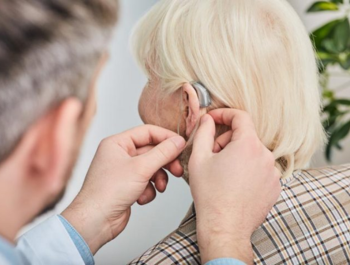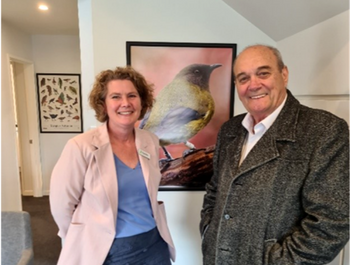Understanding Tinnitus: Breaking the Silence for Tinnitus Awareness Week.
03 February 2025
If you’ve ever experienced a persistent ringing, buzzing, or humming in your ears, you’re not alone. Tinnitus affects millions of people worldwide, yet it remains widely misunderstood. For Tinnitus Awareness Week, we’re shining a light on this often-frustrating condition.
Whether you’ve recently noticed symptoms or have been living with tinnitus for years, knowledge is key to taking control. Let’s explore the facts, debunk common myths, and discuss practical strategies to help you find relief.
What is tinnitus?
Tinnitus is the perception of sound in the ears or head when no external sound is present. It can present in many ways, but is often described as a ringing, hissing, buzzing, or whistling, or as sounding like cicadas or crickets. Tinnitus can be constant or intermittent and heard in one or both ears, or somewhere in the middle. It may fluctuate in volume and quality over time and can be mild or severe. For some people tinnitus is infrequent and noticeable only in quiet, but for others it is constant, severe, and profoundly affects their quality of life.
Tinnitus is not an illness or disease in itself, but is often a symptom of a problem with the ear or hearing nerves.
What causes tinnitus?
The cause of tinnitus is not always known, but it is often associated with change or damage to the auditory system. Common triggers for tinnitus include:
- Noise exposure - prolonged exposure to loud noises, such as music or heavy machinery, or to exposure to very loud, sudden noises, such as explosions or gunshots, can cause inner ear damage resulting in both tinnitus and hearing loss.
- Ageing – the cells of the inner ear gradually deteriorate as you age, which can lead to tinnitus and hearing loss.
- Medications - some prescription medications, such as certain antibiotics, anti-inflammatories, diuretics, and chemotherapy drugs may be harmful to the inner ear as well as the nerves connecting the ear to the brain.
- Hearing disorders - conditions such as otosclerosis and Ménière’s disease are known to cause tinnitus.
- Ear infections or blockages - wax buildup, ear infections, or blockages can cause or worsen tinnitus.
- Head and Neck Injuries - trauma to the head or neck can affect the auditory system and lead to tinnitus.
- Stress or trauma – significant stress can trigger or worsen tinnitus. You may notice that your tinnitus is worse when you are stressed or tired.
- Health conditions - tinnitus can also be a symptom of health conditions including cardiovascular disease, hypertension, diabetes, and temporomandibular joint (TMJ) disorders.
While tinnitus may begin with changes in the ear, the ongoing nature of it is generated by the brain and awareness of it often begins follows stress (of any type).
It is rare that tinnitus is a symptom of a medical condition that requires treatment.
How does tinnitus impact people?
Many people notice tinnitus only intermittently, for example when they are in a quiet room and are not bothered by their symptoms. For others, tinnitus can be constant and severe and can impact sleep, concentration, and mental health. In severe cases, tinnitus can have a profound impact on quality of life.
Many people with tinnitus (around 90%) also experience hearing loss, which can have a significant additional impact on communication, socialising, work, and relationships.
Can you treat tinnitus?
Awareness of tinnitus can be normal, however, if tinnitus is causing distress or disrupting your life, then you should see an audiologist for assessment.
There is currently no cure for tinnitus, however there are techniques and treatments that can help to significantly reduce its impact and improve your quality of life. After a full hearing assessment and consultation to help determine the possible causes of your tinnitus, your audiologist will develop a personalised tinnitus management plan. This may include referral to other medical or allied health professionals if required.
There are many strategies and options to help you successfully manage your tinnitus. These often include a combination of:
- Hearing aids - managing hearing loss accompanying tinnitus is often the best solution. Managing even mild hearing loss that has not been causing significant difficulty will reduce the tinnitus in most cases.
- Sound therapy – sound enrichment involves using soft sounds (such as white noise or music) to shift the focus to external sounds and help the brain learn to “tune out” the tinnitus.
- Informational counselling – understanding your tinnitus and any triggers can make a big difference in reducing its impact.
- Counselling in cognitive management strategies such as Cognitive Behavioural Therapy (CBT).
- Stress management and relaxation techniques.
- Reduction of exposure to loud noise – for example using volume limited headphones or using hearing protection at concerts or events.
- Treatment of any underlying causes, for example wax removal or treatment of ear infections.
What do I do next?
If you believe you may have tinnitus or are concerned about your hearing, we recommend having a full diagnostic hearing assessment with us as a first step. Our Audiologists Caroline, Juliet, and Melissa are registered with ACC to provide support for clients with tinnitus.
Read more
 The sound of change: Bellbird Hearing.
The sound of change: Bellbird Hearing.
 You are unique - your hearing solution should be too!
You are unique - your hearing solution should be too!
 Diabetes and Hearing Loss: Understanding the Connection
Diabetes and Hearing Loss: Understanding the Connection
 Tips for Enhanced Communication and Frequently Asked Questions
Tips for Enhanced Communication and Frequently Asked Questions
 Client testimonial - Tiffany
Client testimonial - Tiffany
 Self Help Guide for Tinnitus Relief Now Available Around the World
Self Help Guide for Tinnitus Relief Now Available Around the World
 Why do I need two hearing aids?
Why do I need two hearing aids?
 4 years of happy ears: Bellbird Hearing
4 years of happy ears: Bellbird Hearing
 Client Testimonial - Colin
Client Testimonial - Colin
 Personalised hearing support: Bellbird Hearing
Personalised hearing support: Bellbird Hearing
 Understanding Sudden Sensorineural Hearing Loss: What You Need to Know
Understanding Sudden Sensorineural Hearing Loss: What You Need to Know
 Hear here: Bellbird Hearing
Hear here: Bellbird Hearing
 Track Testing Motorsport Earplugs at the SCOPE Classic
Track Testing Motorsport Earplugs at the SCOPE Classic
 Tips for hearing in background noise
Tips for hearing in background noise
 Communication Strategies
Communication Strategies
 Sound Solutions: Embracing the Future of Hearing Aids in 2023
Sound Solutions: Embracing the Future of Hearing Aids in 2023
 Keeping the hearing required to run a company - John Baker’s Story
Keeping the hearing required to run a company - John Baker’s Story
 Noise induced hearing loss
Noise induced hearing loss
 The Link between Hearing Loss and Dementia
The Link between Hearing Loss and Dementia
 Do you have itchy ears?
Do you have itchy ears?
 The gift of hearing
The gift of hearing
 Waxing lyrical about hearing
Waxing lyrical about hearing
 Hear to stay: Bellbird Hearing
Hear to stay: Bellbird Hearing